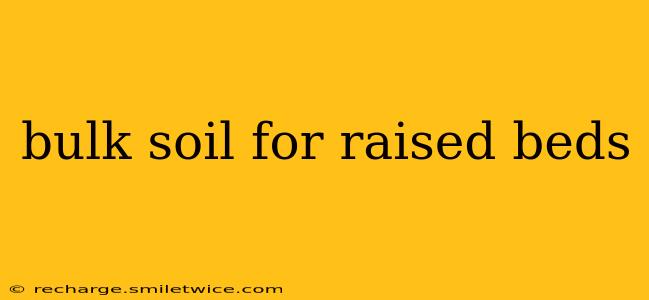Creating thriving raised garden beds starts with the right soil. While you can certainly purchase smaller bags of soil, opting for bulk soil offers significant advantages in cost, convenience, and the ability to create a truly optimal growing environment. This comprehensive guide will walk you through everything you need to know about choosing and using bulk soil for your raised beds.
What are the Benefits of Using Bulk Soil for Raised Beds?
Using bulk soil for your raised beds offers several compelling advantages over buying smaller bags:
- Cost Savings: Purchasing soil in bulk is significantly cheaper per cubic foot than buying numerous smaller bags. This can save you a considerable amount of money, especially if you have multiple or large raised beds.
- Convenience: Having soil delivered directly to your property saves you the hassle of numerous trips to the garden center and the heavy lifting involved in carrying numerous bags.
- Better Soil Quality: Bulk soil often provides a more consistent and higher-quality mix compared to pre-packaged bags, which can sometimes contain varying levels of nutrients and organic matter.
- Customization Options: When buying in bulk, you can often customize your soil blend to perfectly suit the specific needs of your plants.
What Types of Bulk Soil are Available?
Several types of bulk soil are suitable for raised beds, each with its own advantages and disadvantages:
- Topsoil: Topsoil is the uppermost layer of soil, typically rich in organic matter. It’s a good base for raised beds but may need amendments depending on its composition.
- Garden Soil: This blend is often a mix of topsoil, compost, and other organic materials. It provides a good balance of nutrients and drainage.
- Compost: Compost significantly improves soil structure, drainage, and nutrient content. It can be used as a component of a custom soil blend or as a topdressing.
- Potting Mix: This is a lighter, more airy mix ideal for container gardening and can be incorporated into raised bed soil to improve drainage.
- Custom Soil Blends: Many suppliers allow you to create customized blends incorporating different components like sand, peat moss, perlite, or vermiculite to suit your specific needs and soil type.
How Much Bulk Soil Do I Need for My Raised Beds?
Calculating the amount of soil you need depends on the dimensions of your raised beds. You'll need to determine the volume of each bed in cubic feet or cubic yards and then order accordingly. Many bulk soil suppliers offer calculators on their websites to help you determine the right amount.
Calculating Soil Volume:
To calculate the volume of a rectangular raised bed:
Length (ft) x Width (ft) x Height (ft) = Cubic Feet
Remember to account for the volume of any existing soil or other materials already in the bed.
What to Consider When Choosing Bulk Soil:
- Soil Test: Before purchasing any soil, it's highly recommended to conduct a soil test. This will help determine the pH level and nutrient content of your existing soil and inform your decisions on amendments or soil type.
- Drainage: Ensure the soil you choose has good drainage to prevent waterlogging, which can harm plant roots. Amendments like perlite or vermiculite can improve drainage in heavy clay soils.
- Nutrient Content: Consider the nutrient content of the soil to ensure your plants receive the necessary nutrients for optimal growth. Amendments like compost or fertilizer can help supplement nutrient-poor soils.
- Supplier Reputation: Choose a reputable supplier with a history of providing high-quality soil. Look for reviews and testimonials to gauge their reliability.
- Delivery and Handling: Inquire about delivery options and any potential fees. Confirm the supplier's procedures for delivering and handling bulk soil to minimize damage and ensure smooth delivery.
What if my Soil is Poor Quality? How can I Improve It?
Many gardeners struggle with poor-quality soil, whether it is too heavy, too sandy, or lacking essential nutrients. Improving your soil is crucial for success in raised bed gardening. Here's how:
- Amendments: Adding organic matter like compost, peat moss, or aged manure can significantly improve soil structure, drainage, and nutrient content.
- Soil Testing: As mentioned, a soil test will identify specific deficiencies and guide your amendment choices.
- Top Dressing: Applying a layer of compost or other organic materials as a top dressing can improve the soil’s surface and provide essential nutrients.
By carefully considering these factors and choosing the right bulk soil for your raised beds, you'll be well on your way to creating a thriving garden. Remember to always conduct a soil test and choose a reputable supplier. Happy gardening!
